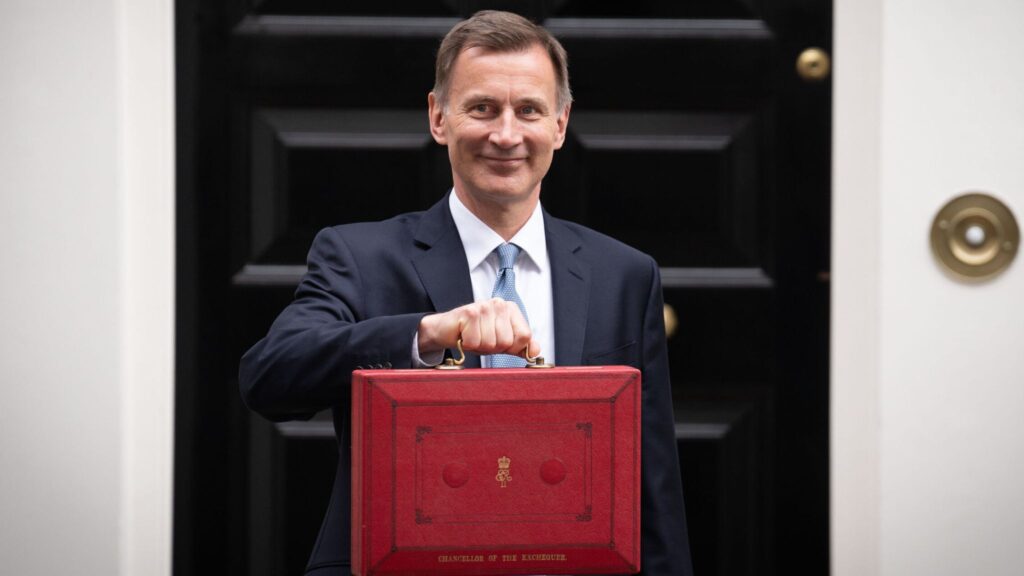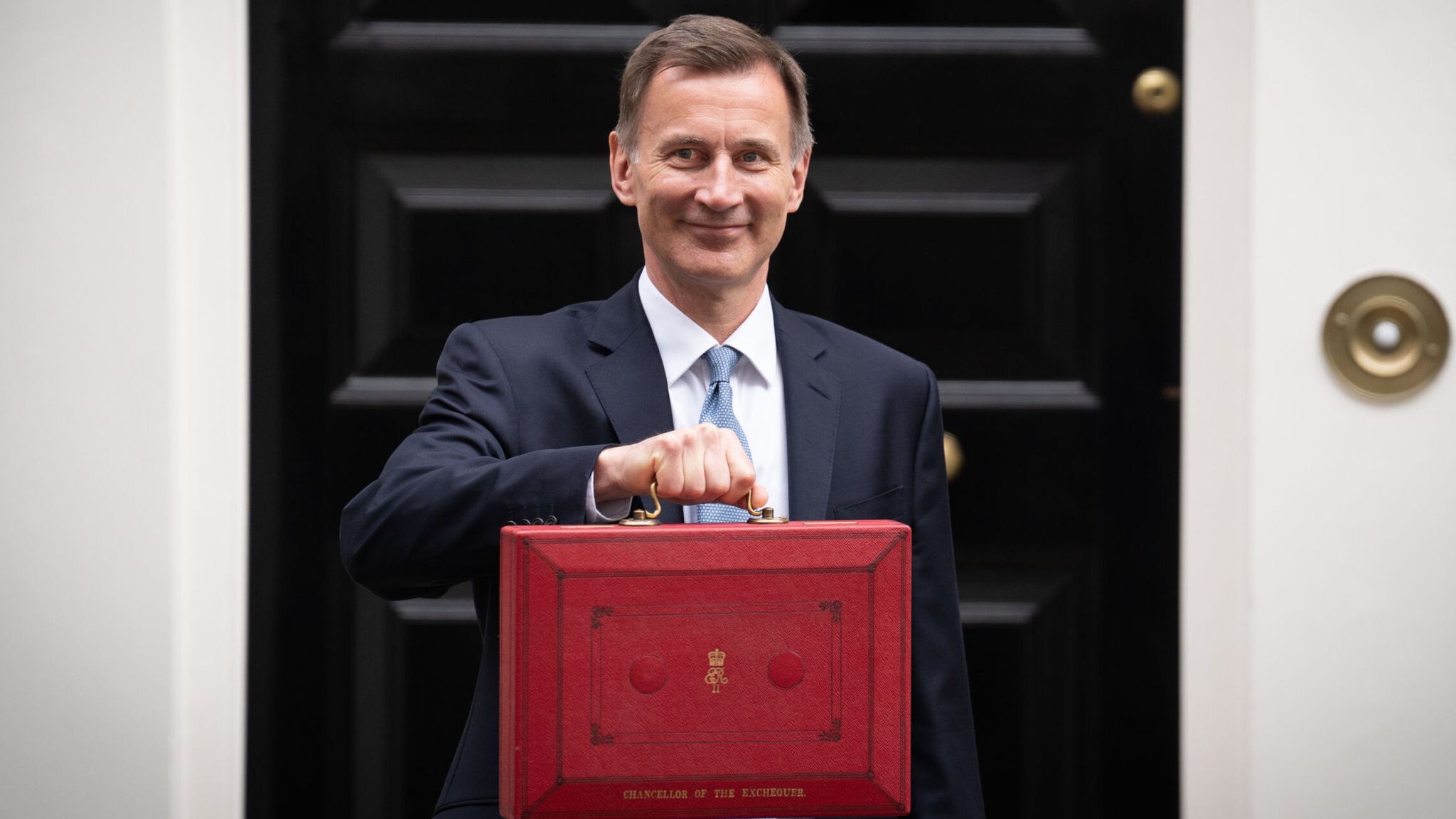
Will the chancellor offer tax cuts in a bid to win votes or steer clear of any bold moves with potential to backfire?
Jeremy Hunt, the United Kingdom’s chancellor of the Exchequer, is poised to deliver his spring budget as the country prepares itself for the likelihood of a general election this year.
Despite coming under pressure from within his party to unveil a package of pre-election goodies on Wednesday, Hunt has pledged to deliver a “responsible” budget amid speculation that Prime Minister Rishi Sunak believes that his finance secretary “lacks imagination”.
Indeed, on Monday, the prime minister’s spokesperson was forced to deny allegations that Sunak, himself chancellor from 2020 to 2022 during the Conservative Party premiership of Boris Johnson, viewed Hunt as “timid”.
“Absolutely not,” the spokesperson said. “The chancellor is working very closely with the prime minister to deliver our plan for the economy, and obviously, the chancellor will be setting out further measures in line with that on Wednesday at the budget.”
What might we see in the British budget?

What is the budget, and why is it important?
The UK raises and spends more than 1 trillion pounds ($1.27 trillion) each year. Hunt, therefore, occupies one of the most important offices of the British state. The most public part of the chancellor’s duties is delivering the annual budget statement, which is presented to the House of Commons, usually in March – just before the end of the UK tax year on April 5.
The budget contains the government’s tax-raising or tax-lowering commitments and outlines its public service spending plans for the year ahead.
Because Scotland, Wales and Northern Ireland have their own devolved administrations, not everything announced by Hunt will be applicable across the whole country. For instance, spending on defence affects the whole of the UK whereas spending policies he announces for the education sector will apply to England only.
The Scottish government in Edinburgh, for example, runs Scotland’s domestic affairs through a Westminster block grant and has the power to vary its own levels of income tax. Lawmakers at the Scottish Parliament passed the 2024-25 Scottish budget bill late last month.
What is the current state of the UK economy?
The British economy slipped into recession late last year. In February, however, the governor of the Bank of England (BoE), Andrew Bailey, said there were now “distinct signs of an upturn”.
Despite this, mortgage rates for many British homeowners remain cripplingly high as a result of economic decisions taken by former Conservative Prime Minister Liz Truss and her chancellor, Kwasi Kwarteng, less than two years ago.
For his part, Sunak maintains that the economy of the UK, where BoE interest rates remain at a 15-year high of 5.25 percent, is “on the right track”.
Which part of the budget will come under the most scrutiny?
Reports suggest that Hunt is considering personal tax cuts for working people. It is widely expected that Hunt will make a cut of 2 percentage points to National Insurance, a tax that helps to pay for some state benefits. Making National Insurance payments counts towards one’s entitlement to the state pension in the UK.
But indications are that the chancellor, limited by financial constraints, will be able to make only modest changes despite the Conservative instinct to boost economic growth by lowering taxes.
“Cutting tax is a shibboleth for the Conservative right,” James Mitchell, a professor at the University of Edinburgh’s School of Social and Political Science, told Al Jazeera. “Every Conservative chancellor needs to either cut taxes, show that is the intention in time or explain why tax cuts are not immediately possible.”
Last week, the Institute for Fiscal Studies (IFS) warned the government not to make uncosted tax cuts. Indeed, the spectre of Truss’s calamitous reign as prime minister – which came to an ignoble end after just 44 days following the decision of Kwarteng to make unfunded tax relief pledges in September 2022, causing the British economy to tank – hangs ominously over Hunt.
“Hunt will … be well aware that any bold measure could backfire as it did spectacularly under Truss,” Mitchell said.
“The chancellor also clearly does not come from that wing of the party and may take a longer-term view and recognise he does not want to go down in history alongside Kwarteng as one of the most fiscally foolish chancellors in history. Much may hinge on whether he inclines towards appealing to his party’s core or a reputation for competence.”
Is this budget particularly significant?
Being this close to a general election means the budget is particularly important. The forthcoming general election has to be held no later than January 28.
The budget is, according to observers, something of a last chance saloon for a Conservative Party that is about 20 points behind the Labour Party, the main opposition party, in opinion polls.
So as well as offering the Conservatives the chance to court voters through some kind of tax-cutting initiative, the budget also provides Hunt with the opportunity to spike Labour’s guns.
What else might the chancellor announce?
According to reports, the chancellor may take aim at the Labour Party’s two proposed sources of revenue as a future UK government – abolishing the so-called “non-dom” status (used by some UK residents, mostly wealthy, to avoid paying tax on money made abroad) and an extended windfall tax on energy companies.
Speculation is rife that Hunt will commandeer these Labour policies in Wednesday’s budget in a bid to derail opposition spending plans – and raise the money required to cut personal taxes for workers.


